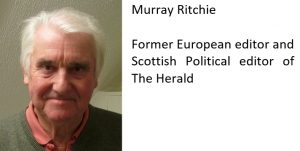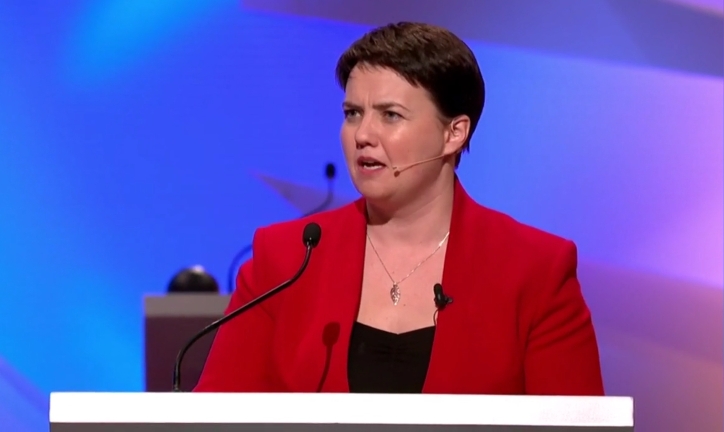Add together the Scottish contingent in the Commons – 35 SNP, 13 Tories, seven Labour and four Liberal Democrats – and you find a formidable bloc for Britain either remaining in the EU or at least in the single market or with access to it, writes Murray Richie.
Theresa May’s disastrous misjudgment in calling the Brexit election has paradoxically breathed new life into the Scottish Conservatives – and the bad news for the prime minister is that the Scottish Tory intake are mostly soft Brexit and single market supporters.
They will have an unusually strong influence on the government’s negotiations with the European Union (EU) on Brexit. Their leader, the personable Ruth Davidson, campaigned for Remain and now supports a Brexit that is “open” – her curious definition – but she is known to support access to the EU single market and the customs union.
 Ms Davidson is the rising star of the British Tories and already talked about as a future UK party leader. Like Mrs May she can be a “bloody difficult woman”.
Ms Davidson is the rising star of the British Tories and already talked about as a future UK party leader. Like Mrs May she can be a “bloody difficult woman”.
She is known to have defied the prime minister when ordered to campaign during the general election for the party line that no deal was better that a bad deal.
While Theresa May droned on about “strong and stable government” in the Brexit talks Ms Davidson concentrated on attacking the Scottish National Party (SNP) leader, Nicola Sturgeon. The people of Scotland don’t want a second independence referendum, she claimed repeatedly and the result proved she was right.
They didn’t. Or if they did, they did not want it any time soon.
The anti-Indyref2 cry was taken up by the three other Unionist parties until the chorus almost drowned out the “strong and stable” mantra as the election’s most tedious slogan. But it was a huge success.
While Mrs May was busy losing 13 Tory seats and her Commons majority, Ms Davidson was happily gaining 12. Not unnaturally there is now a feeling of immense satisfaction in the Scottish Tory ranks.
Scottish Tories are not known for obsessing about immigration.
The party is back in business after years of being sidelined and dismissed as a joke. The old one about Scotland having more pandas than Tory MPs is suddenly redundant.
Add together the Scottish contingent in the Commons – 35 SNP, 13 Tories, seven Labour and four Lib Dems – and you find a formidable bloc for Britain either remaining in the EU or at least in the single market or having open access to it.
Scottish Tories are not known for obsessing about immigration. The SNP has repeatedly argued that Scotland needs and wants more immigrants to meet the needs of the economy. That is another reason for all the major Scottish parties opposing a hard Brexit.
All this guarantees that when Mrs May – if she is still around – comes to the Commons at decision time on Brexit she will find a fresh and powerful new force against her and a hard Brexit.
Hard-line Tory Brexiteers will find life much less congenial, and there is not much they can do about it. Unless, of course, there is another general election soon and the Commons is reconfigured. But that is unlikely.
Going to the polls yet again would let the reinvigorated Labour Party’s dream come true. Mrs May or her successor simply cannot take that risk.
In Scotland there is suddenly an exciting awareness that MPs from north of the Border have relevance again. While the SNP had 56 of them until last week they did not achieve much as they banged their heads against a Tory majority. But all is now changed.
The SNP’s stance against a hard Brexit chimes with Ms Davidson’s words at a post-election news conference: “We must seek to deliver an open Brexit, not a closed one, which puts our country’s economic growth first”. She defined this as a Brexit which allowed the “greatest amount of free trade”.
To add another touch of horror to Mrs May’s Brexit nightmare there is the fact that Ms Davidson is no friend of the Democratic Unionist Party (DUP), the prime minister’s new parliamentary crutch.
The Scottish Tory leader is gay and opposes the religious fundamentalism of the hard-right Ulster Protestants. She is about to marry an Irish Catholic woman and is deeply suspicious of the DUP and its historic links to Ulster’s Orange lodges.
But there is one area where Ms Davidson and the DUP might find agreement. She and they favour a “seamless and frictionless” border with the Irish Republic. A deal to keep the border unchanged would assist the Northern Ireland peace process, all agree.
Ms Davidson is so popular with the Scottish Tories that there are mutterings about her leading moves to form an independent Conservative party in Scotland. Some Scottish Tories always wanted freedom from London control although they say they would remain in harmony with most of the UK party’s ideals.
This suggestion surfaced occasionally when the Scottish Tories were in the doldrums, but this is the first time it has shown itself when they are cracking open the sherry. Ms Davidson has dismissed the latest speculation.





